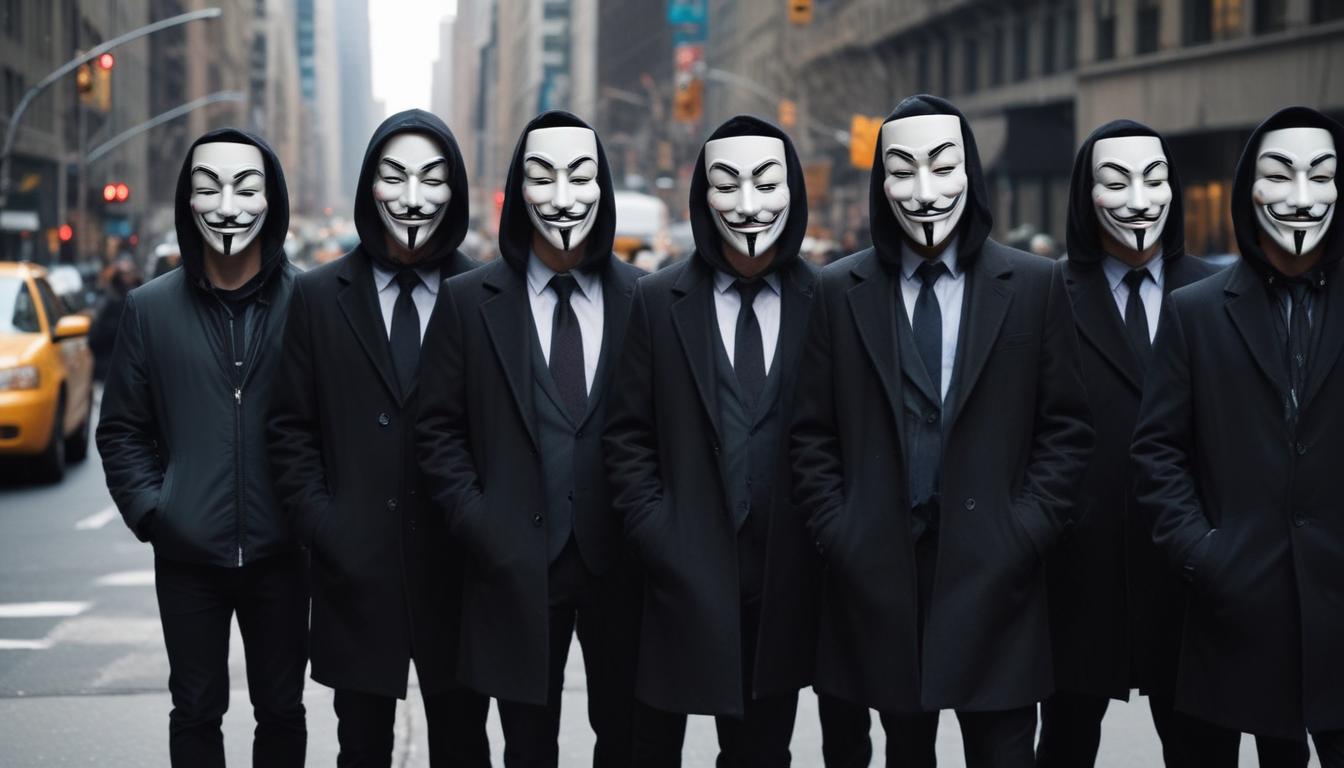Anonymous, often symbolized by the iconic Guy Fawkes mask, is a decentralized international activist and hacktivist collective and movement. Its origins, principles, and actions have made it both a subject of fascination and controversy. This article delves into the story of Anonymous, exploring its beginnings, key operations, and impact on the global stage.

Origins and Formation
The story of Anonymous begins in the early 2000s on the imageboard website 4chan. Users of the site, who frequently posted anonymously, began to form a loosely associated group around the idea of “doing things anonymously.” Initially, their activities were more about internet pranks and trolling, but over time, their actions evolved into more serious endeavors, particularly focusing on activism and hacktivism.
The Rise of Hacktivism
Anonymous first gained widespread attention in 2008 with Project Chanology, a campaign against the Church of Scientology. The movement was sparked by the church’s attempt to remove an interview with Tom Cruise from the internet. Anonymous responded with a series of coordinated attacks, including DDoS (Distributed Denial of Service) attacks on Scientology websites, prank calls, and other disruptive activities. This marked a shift from mere trolling to organized hacktivism.
Key Operations and Actions
Over the years, Anonymous has been involved in numerous high-profile operations. Some of the most notable include:
-
Operation Payback: In 2010, Anonymous launched Operation Payback, initially targeting organizations opposing internet piracy. This operation evolved to support WikiLeaks, with attacks on companies that had cut off services to WikiLeaks, including PayPal, Visa, and MasterCard.
-
Operation Tunisia: During the Arab Spring in 2011, Anonymous played a role in supporting Tunisian revolutionaries. They provided tools to bypass government censorship and launched attacks on government websites to support the protests against then-president Zine El Abidine Ben Ali.
-
Operation Sony: In response to Sony’s legal actions against hackers George Hotz and Graf_Chokolo, Anonymous initiated Operation Sony. They targeted Sony’s online properties, causing significant disruptions.
-
Operation HBGary: In 2011, Anonymous attacked the cybersecurity firm HBGary Federal after its CEO, Aaron Barr, claimed he had infiltrated Anonymous and would reveal its members. In retaliation, Anonymous hacked HBGary’s website, leaked tens of thousands of emails, and defaced the company’s website.
-
Operation Ferguson: Following the shooting of Michael Brown in Ferguson, Missouri, in 2014, Anonymous launched Operation Ferguson. They took down city websites and released personal information of Ferguson officials in response to what they viewed as police brutality and systemic injustice.
Organizational Structure
One of the most intriguing aspects of Anonymous is its lack of a formal leadership structure. The collective operates on principles of anonymity, decentralization, and collaboration. Anyone can claim to be part of Anonymous, and decisions are often made through consensus in online forums and chat rooms. This structure has both strengths and weaknesses, providing flexibility and resilience but also making coordinated efforts more challenging.
Philosophy and Ideals
Anonymous is driven by a diverse set of philosophies and ideals, unified by a few core principles. These include a commitment to free speech, internet freedom, and opposition to censorship and corruption. Their motto, “We are Legion. We do not forgive. We do not forget. Expect us,” reflects their collective identity and their readiness to act against perceived injustices.
Controversies and Criticisms
Despite its many high-profile actions, Anonymous has faced significant criticism. Their methods, which often involve illegal activities such as hacking and DDoS attacks, have led to numerous arrests and legal actions against alleged members. Critics argue that their tactics can be reckless and harmful, potentially endangering innocent people and violating privacy. Additionally, the lack of accountability and transparency within the group can lead to actions that do not always align with their stated principles.
Impact and Legacy
Anonymous has undeniably left a significant mark on the digital and real-world landscapes. They have brought attention to various issues, supported revolutionary movements, and challenged powerful institutions. However, their impact is mixed, with successes often accompanied by controversies and unintended consequences.
As the internet continues to evolve, so too does Anonymous. The collective remains active, adapting to new technologies and shifting political landscapes. Whether viewed as digital vigilantes or cyber-terrorists, the story of Anonymous is a testament to the power and potential of decentralized, grassroots activism in the digital age.
Conclusion
The story of Anonymous is complex and multifaceted, reflecting the diverse motivations and actions of its members. From its origins in online pranks to its evolution into a global hacktivist collective, Anonymous has played a unique role in shaping the discourse around internet freedom, censorship, and activism. Their legacy, while contentious, underscores the growing influence of digital activism in the modern world.